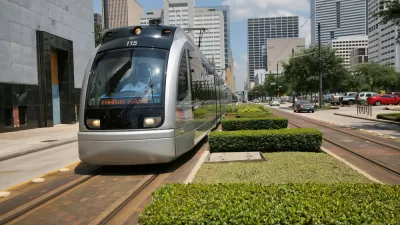An advocacy group is calling for ‘sustainable, vertical’ mixed-use urbanism in the famously sprawling city.

The Texas chapter of the Council on Tall Buildings and Urban Habitat (CTBUH) is calling for increased density in Houston after a survey revealed that roughly 60 percent of respondents want the opportunity to live in a mixed-use development, favoring them over single-family homes.
Urban Edge’s John Brannen spoke with CTBUH’s leader, Mide Akinsade. According to Akinsade, “As part of city formation, the automobile has had the most impact in terms of urban sprawl. Unfortunately, it’s not sustainable because we’re creating all these impervious surfaces of roads. We have so many highways and the city is so vast.”
Akinsade says that the group is looking for “sustainable, vertical urbanism.” While the vertical part exists in Houston, the city still has little diversity in land use, forcing residents to travel farther to meet different needs. “It’s that kind of attitude and overlaying it with sustainability. When you’re walking you want to walk in shaded streets. You want to have pocket parks. That’s what is at the root of what I’m trying to bring to Houston.” Akinsade also points to the city’s many bayou waterfronts as an underdeveloped asset. “Those should be the city’s playground,” Akinsade said, adding, “I understand the ebb and flow of the bayou and the amount of capital that might need to be invested.”
FULL STORY: Tall building council looks upward to support a more walkable, sustainable Houston

Study: Maui’s Plan to Convert Vacation Rentals to Long-Term Housing Could Cause Nearly $1 Billion Economic Loss
The plan would reduce visitor accommodation by 25,% resulting in 1,900 jobs lost.

North Texas Transit Leaders Tout Benefits of TOD for Growing Region
At a summit focused on transit-oriented development, policymakers discussed how North Texas’ expanded light rail system can serve as a tool for economic growth.

Why Should We Subsidize Public Transportation?
Many public transit agencies face financial stress due to rising costs, declining fare revenue, and declining subsidies. Transit advocates must provide a strong business case for increasing public transit funding.

How to Make US Trains Faster
Changes to boarding platforms and a switch to electric trains could improve U.S. passenger rail service without the added cost of high-speed rail.

Columbia’s Revitalized ‘Loop’ Is a Hub for Local Entrepreneurs
A focus on small businesses is helping a commercial corridor in Columbia, Missouri thrive.

Invasive Insect Threatens Minnesota’s Ash Forests
The Emerald Ash Borer is a rapidly spreading invasive pest threatening Minnesota’s ash trees, and homeowners are encouraged to plant diverse replacement species, avoid moving ash firewood, and monitor for signs of infestation.
Urban Design for Planners 1: Software Tools
This six-course series explores essential urban design concepts using open source software and equips planners with the tools they need to participate fully in the urban design process.
Planning for Universal Design
Learn the tools for implementing Universal Design in planning regulations.
City of Santa Clarita
Ascent Environmental
Institute for Housing and Urban Development Studies (IHS)
City of Grandview
Harvard GSD Executive Education
Toledo-Lucas County Plan Commissions
Salt Lake City
NYU Wagner Graduate School of Public Service





























